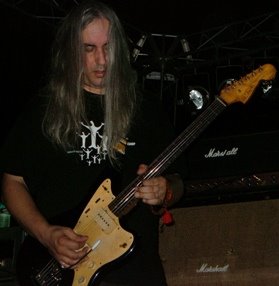
Bear with me here. I'm feeling out a few arguments for my thesis, using this because it's a little more inviting than microsoft word. That program's so sterile and cold sometimes I can hardly bear it. Consider this a rough rough draft.
Anyway, I've been thinking a lot about aesthetic and emotional honesty in music, and why critics like myself can spot a band's bullshit from a mile away and why millions of people cannot or don't want to. It seems like a rather clean cut "critic" vs. "audience" discussion aesthetics classes have all the time. But I'm also trying to reconcile the fact that genuine shit exists. No, not Sum-41 that's
genuine shit. I mean, say, the new Dresden Dolls album, or the fourth Deftones album or the latest Jonah Matranga
Sketchy EP or Thursday's
War All The Time. They're all albums created from what I can tell are open and honest intentions, but they're all flat and
seem contrived. And maybe they are contrived because of label, personal or fan pressure to recreate a moment they once created.
I want to get at the root of why an album (or even a live performance) has "it," that unnamed carthartic element that separates high art from bullshit. It's, of course, an imperfect science because art is so subjective and personal. The best solution I can come to so far is to pinpoint certain bands at their respective peaks, whether that peak be an album or a series of releases and describe what it is that separates them :
The Flaming Lips: their constant exploration of both music and showmanship
The Arcade Fire: their intense humility*
Nine Inch Nails: Trent Reznor's demons
Radiohead: Thom Yorke's demons
Beck: exuberance, music appreciation
The Locust: prodding the line between what an audience can and cannot handle
Les Savy Fav: treating every show like an art exhibition
Kill Me Tomorrow: losing themselves within their dark underbelly
Fugazi: standing by their ideals while pushing themselves as far as possible musically
Devendra Banhart: blending lost arts with new poetics
Just in that list I see a few patterns emerge:
Dealing with inner emotion and funneling them through the amps
Never settling for status quo
Embracing music as art without worrying about "pretension"
Digging into the past as influence, not guiding principle or direct forefather
I'm sure there are more, but I'm kind of tired.
Anyway, I got on this kick because I watched Dashboard Confessional in a live performance today on MTVHD and admired the fact he still sang all of his songs with the heart it sounded like he was singing with on his first two records. He, along with Thursday, Saves the Day and a few others embody the merge between punk, hardcore and emo. That coalescing might be another element: when an artist is caught up in a movement their fans or the media created--turning their albums into instant classics whether they want them to or not. Their albums have been canonized and revered and overplayed and left for dead.
But there was a reason they became so popular and insighted such a cultural paradigm shift--they meant what they sang about...whether it was about adulterous hair, Ian Curtis or crucifixion.
It also needs to be noted that he was playing in Colorado in front of uber-fans a solid six years after after he began ravaging my college campus. (that just speaks to cultural divisions...I mean, seriously...there were dudes in the crowd singing every single line. That was tolerable-ish six years ago, but it's over now)
Really though, it does interest me that living in such a hugely pop-cultured area causes me to see musical shifts monthly--and in some towns in Colorado a band like Dashboard still affects the kids there. But, it's understandable they'd still be attached to him in some ways. I was watching a Bruce Springsteen thing before the Dashboard thing, and both artists have some of that unnamed appeal: I'll just call it emotional honesty. They mean what they're delivering--even if the boss's delivery is better. I can think of a lot worse things than listening to Dashboard, who, truth be told, can write a goddamned catchy, emotional song--it's just too bad he won't enunciate and he got swept up in a "movement."
So, you'll ask, "What if Sum-41 or My Chemical Romance really means what they're singing about." I firmly believe there's an originality clause in music and musical study. It's why The Arcade Fire works: sure, Win might sound a tad like the David Byrne, but they also sound like a country orchestra--not even Wilco has found such a common ground between new wave, country and rock. Or why Dashboard worked: no one was singing acoustic punk songs about real relationships when he did it. Or why Nirvana worked: Kurt Cobain's voice sounds like nothing before it or since.
In a nutshell, I mean emotional honesty is just part of the equation. It needs artistic exploration as well. That's why I can't take Franz Ferdinand and co. seriously--I didn't like it the first time, when it was called Gang of Four. And why I have trouble with Tool now, because I got into King Crimson. (although Maynard's inner demons do take them to another plane.)
I'm listening to the new Boy Sets Fire. There are gorgeous moments and there are dorky ones. As a whole, I like it because they're trying something new for them. It's almost like they've been listening to Megadeth at times, which is both good (great amounts of anger) and bad (there are parts that are way too polished). And they're still political, which is very admirable in this era of disaffection.
Anyway, I've rambled enough. And lost enough credibility by discussing an emo icon as a legit artist.
*I make an assumption with The Arcade Fire that they will be able to maintain their debut album's majesty.
************************************************************************************

P.S.
ok. i've been trying to get shots like these two at the Che ever since I started taking pictures. When they actually turned out I may or may not have popped a boner. Thank you An Albatross.

 I've been on a bit of a Tool kick lately, and I'm assuming it's some subconscious reaction to the fact the new album is about one month away from being released (May 2). Allegedly it's going to be called 10,000 Days, but I doubt that.
I've been on a bit of a Tool kick lately, and I'm assuming it's some subconscious reaction to the fact the new album is about one month away from being released (May 2). Allegedly it's going to be called 10,000 Days, but I doubt that. Man. Tool and The Mars Volta are rock saviors or goats, depending on what they each come up with next.
Man. Tool and The Mars Volta are rock saviors or goats, depending on what they each come up with next.











